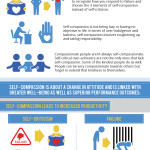
Many of us believe being self-critical and hard on ourselves is a good thing.
We mistakenly think that being competitive and pushing ourselves hard is required for success. Research, however, is proving these theories wrong. Most of us don’t stop to consider whether our self-critical and competitive attitude are helping us achieve our goals. We don’t realize that they are actually standing in our way.
Scientific data shows that self-criticism makes us weaker in the face of failure, more emotional, and less likely to assimilate lessons from our failures. Studies are finding that there is a far better alternative to self-criticism: self-compassion.
Thought the term “self-compassion” may sound like self-indulgence or may feel like a weakness, it is actually the secret to resilience, strength in the face of failure, the ability to learn from mistakes and to bounce back with greater enthusiasm.
Self-compassion involves treating oneself as one would a friend, being more mindful, and understanding our situation in the context of a larger human experience. When we can be more understanding and gentler with ourselves, identify less with the emotions that surround our mistakes, and understand that failure is a normal part of the larger human experience, we become stronger and more successful in the long run. We become stronger and more resilient. And, as Sri Sri Ravi Shankar so simply puts it, the state of your life depends on the state of your mind. So be kind to yourself.
For a summary of the data and a quick reminder you can keep on your wall or desk, see the info graphic below!


I love the Infographics! Is there anywhere we can download them in pdf form to print? Or can they be purchased? Thanks!
Does the notion that there is essentially no distinction between an oak tree and me lead to true compassion? Many believe that it does. Phenomena are interdependant and contingent upon a myriad causes and conditions according to buddhist ideology leaving no permanent, abiding self that falsely creates a distinction between subject and object. Such beliefs do engender compassion for us and them, any phenomena.
There seems to be gathering evidence that compassion practiced as a virtue leads to several health benefits! Do see below;
http://www.insightopen.com/2016/03/compassionate-intention-setting-and-its-health-benefits/
Thanks, Ajit